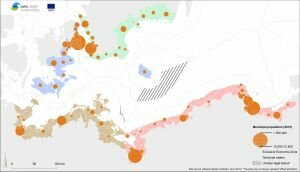Setting the scene
In this case, transboundary MSP has to pay particular attention to coherence with the existing plans for the German EEZ as well as the respective 12nm zones (MSP Mecklenburg-Vorpommern and Schleswig-Holstein). Furthermore, the transboundary process in this case study area should ensure that Denmark and Poland can align their preparatory and/or start up work on MSP in their countries and that authorities and stakeholders from these neighbouring countries can bring any issues of cross-border concern to the attention of for instance the Swedish planning authority (SwAM) and vice versa. In particular, this case will also enable broad cross-border consultation on the “feasibility study” recently conducted for the Polish MSP with the respective counterparts in Denmark, Sweden and Germany, ensuring that the missing information identified can be collected.
The South West Baltic case study area includes the territorial seas of Denmark, Sweden, Poland and Germany. Image below provides an overview of the area, showing municipalities, urban areas, respective territorial waters and Exclusive Economic Zone (EEZ) as well as size of population on municipal level. The area involves cities with more than 200,000 inhabitants such as Copenhagen, Malmö, Gdansk, Szczecin, Rostock and Lübeck. SWB countries face common challenges concerning, for instance, demographic development, economic growth, unemployment (especially among young people) and rural development.

Image: Municipal population in the South West Baltic case study area.
Even though the four countries belong to the EU, they have individual national planning systems and legal basis for spatial planning. It is therefore predictable that the national MSPs will be integrated in the already existing spatial planning systems in these countries. Thus maritime spatial plans will look different in each country and will most probably be influenced and shaped by the land-based spatial planning system at hand. Understanding the different national planning systems is important for the future work on MSP in the SWB. Therefore, a brief description of the Danish, Swedish, Polish and German land-based planning systems is provided in the report “Land-based planning and the added value of cross-border cooperation” prepared by Nordregio.
The process of developing Maritime Spatial Plans is in different stages in the countries covered by the SWB case study area. For instance, Germany has developed the first MSP already in 2009 and Denmark is currently working on a new Planning Act that will include the maritime space. The following sections provide a brief description of the current status of MSP in each country.





